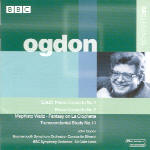On the basis of his recordings, John Ogdon’s Liszt playing either could be tremendously exciting or stone-cold sober–or it could range from rough around the edges to winged and incandescent. Some collectors may remember an out-of-print BBC Radio Classics Ogdon/Liszt release that unearthed a ragged, heavy-handed 1983 broadcast of the First Concerto. Happily, BBC Classics turns up an infinitely superior 1967 performance with conductor Constantin Silvestri at the epicenter of an orchestral earthquake, his interpretation teetering on the brink of vulgarity without falling into the chasm. Ogdon’s fingers are similarly galvanized, although his ruminative amble through the Quasi adagio section lacks concentration and cohesive flow.
The same criticism can be leveled at Ogdon’s outstretched rubatos in the A major concerto’s Un poco più mosso. Otherwise, the pianist and Colin Davis prove a tightly knit team, serving up inspiring moments of razor-edged soloist/orchestra interplay (notably in the Allegro Deciso). Interestingly in the coda, Ogdon first plays Liszt’s optional chordal passage in sync with the timpani, switching to the more common glissandos the second time around. The pianist takes a while to get going in Mephisto Waltz No. 1, but he hits his expressive stride in the middle section and takes enormous chances in the work’s final four minutes–altogether a less polished but more exciting alternative to Ogdon’s 1962 EMI studio recording.
Lastly, BBC Legends offers two works new to Ogdon’s discography. The Grande Fantasie de bravoure sur la Clochette de Paganini is basically an expansion of Liszt’s better-known La Campanella, with an introduction, four times more music, and technical hurdles galore. Ogdon nonchalantly surmounts its difficulties but doesn’t really throw himself into the score at full force in the manner of Sergio Fiorentino’s more demonic, imaginative traversal (type Q1654 in Search Reviews for my comments). Harmonies du soir is performed in its seldom-heard 1837 edition rather than the 1851 revision most people play. Ogdon’s straightforward reading falls short of the breadth and lyric poetry that make the Richter and Arrau recordings more memorable. An uneven collection, overall, but with enough great moments to entice Liszt lovers and Ogdon acolytes.
































